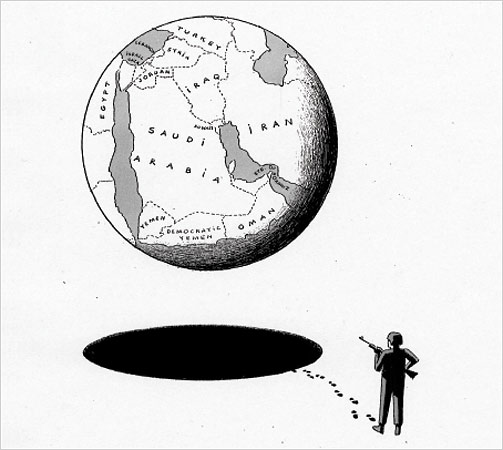2006/12/12, 作者們是麻省理工學院的同學.對美國伊拉克研究小組報告的評論,也可參閱Going for Broke
離岸平衡手...
By EUGENE GHOLZ, DARYL G. PRESS and BENJAMIN VALENTINO
THE Iraq Study Group’s recommendation that the United States withdraw its combat forces from Iraq reflects a growing national consensus that our military cannot quell the violence there and may even be making matters worse. Although many are hailing this recommendation as a bold new course, it is not bold enough. America will best serve its interests in the Persian Gulf by withdrawing its ground-based military forces not only from Iraq, but from the entire region.
Critics of the report continue to debate the wisdom and details of a drawdown in Iraq, but there has been no debate about America’s broader strategy in the gulf. Policymakers and analysts from across the political spectrum assume that the United States must maintain a robust military presence there.
The bipartisan authors of the report, for example, advocate maintaining “a considerable military presence in the region” including “powerful air, ground and naval deployments in Kuwait, Bahrain and Qatar” even after the last American combat troops leave Iraq. Others — including Donald Rumsfeld and Hillary Clinton — go further and consider strengthening our forces around the gulf by shifting some troops from Iraq to neighboring countries.
Maintaining a large military presence in the region has been the cornerstone of American policy since the 1991 Persian Gulf war, and remains so today. With the Iraq war, we now have tens of thousands of troops elsewhere in the neighborhood.
But this strategy is flawed. In fact, many of the same considerations that led the Iraq Study Group to call for withdrawal of combat forces from Iraq suggest that the United States should withdraw its troops from neighboring states as well — leaving only naval forces offshore in international waters. As in Iraq, a large United States military footprint on the ground undermines American interests more than it protects them.
Just as our troops on Iraqi streets have provided a rallying point for the insurgency, the United States military presence throughout the region has been a key element in Al Qaeda’s recruitment campaign and propaganda. If America withdrew from Iraq but left behind substantial forces in neighboring states, Al Qaeda would refocus its attacks on American troops in those countries — remember the 1996 bombing of the Khobar Towers in Saudi Arabia?
Worse, the continued presence of our military personnel across the region will continue to incite extremists to attack American cities. Osama bin Ladin repeatedly stated that the presence of American forces on the holy ground of the Arabian Peninsula was a primary reason for 9/11.
Our presence also destabilizes our important regional allies. Not only do American bases make these countries a target for terrorists, but many of their citizens bristle at the sight of United States bases on their soil. Indeed, the most serious near-term threat to our energy interests is the overthrow of friendly governments by domestic Islamic extremists, a danger that is increased by the presence of our troops.
The good news is that the United States does not need to station military forces on the ground in Persian Gulf countries to protect its allies or to secure its vital oil interests. For nearly 30 years, Pentagon planners have focused on two principal threats in the gulf: the conquest of major oil reserves (by the Soviet Union or a regional power like Iraq or Iran) and interference with shipping through Persian Gulf waters, particularly through the Strait of Hormuz. Forces stationed “over the horizon” — afloat in the Indian Ocean and at bases outside the Middle East — can address both threats.
By maintaining a strong naval presence in the Indian Ocean, along with some naval forces in the international waters of the Persian Gulf itself, the United States would be able to thwart an invasion of any gulf oil producer. Long-range American aircraft stationed at Diego Garcia, an island in the Indian Ocean, could contribute as well. Should more substantial threats arise, those air and naval forces would buy time for ground forces and land-based aircraft to return to bases in the region.
This is the same strategy that the United States used to defend the Persian Gulf during the later years of the cold war. It would be even more effective now. Today’s adversaries have considerably less offensive military power than 15 years ago: the Soviet Union is gone; two wars with the United States have destroyed Iraq’s offensive capacity; and Iran’s poorly trained and ill-equipped ground forces have grown even more obsolete.
While the threats have withered, new technology has vastly increased American military capabilities. Today, aircraft carrier strike groups can carry hundreds of precision land-attack cruise missiles in addition to their complement of aircraft (which also drop precision weapons). And long-range Air Force bombers are now far more lethal against ground targets, particularly targets advancing across highways and open desert.
Yes, there are limits to our military might. America’s vast firepower is ill suited for policing the streets of Baghdad, or forcing Sunnis, Shiites and Kurds to get along in Iraq. But our modern weapons could easily halt an Iraqi or Iranian invasion in its tracks.
Protecting the flow of oil through narrow shipping lanes in the gulf is a more difficult mission. But responding to Iranian mines or cruise-missile attacks on oil tankers would not require ground forces or land-based aircraft to be stationed in the Persian Gulf during peacetime. In fact, in a war in the Strait of Hormuz, American operations would be carried out largely by submarines, surface ships and naval aircraft — all of which could be stationed in the Indian Ocean during peacetime.
There are, of course, other threats to American interests in the region. Terrorists could damage key oil fields and ports, or friendly governments in the gulf could be toppled by anti-American extremists. These concerns, however, do not justify peacetime forward deployment. United States allies play the primary role defending their own oil fields and safeguarding their internal security, and their forces are better suited for the job. If anything, the presence of “infidel” soldiers nearby increases the likelihood of terrorist attacks and political upheaval.
This does not mean the United States can withdraw all its military power from the region tomorrow. As the Iraq Study Group persuasively argued, forces will be needed in Iraq during a transition to train Iraqi troops, to guard against threats to topple the government in Baghdad, and to strike at any newly discovered Al Qaeda threats. But these missions can be conducted from a small number of temporary Iraqi bases in remote parts of the country, where the American soldiers would be less visible and less vulnerable.
The Iraq war is now a painful failure for the United States. One silver lining brightens that gray backdrop. The Iraq debacle creates an opportunity to reassess longstanding policies that would otherwise be too difficult to change and prompts us to rethink the premises of United States military policy toward the Persian Gulf region. The best way to increase our security and the stability of that troubled region is, paradoxically, to drastically reduce our military presence there.
Eugene Gholz is a professor of public affairs at the University of Texas. Daryl G. Press and Benjamin Valentino are professors of government at Dartmouth.


 字體:小 中 大
字體:小 中 大









